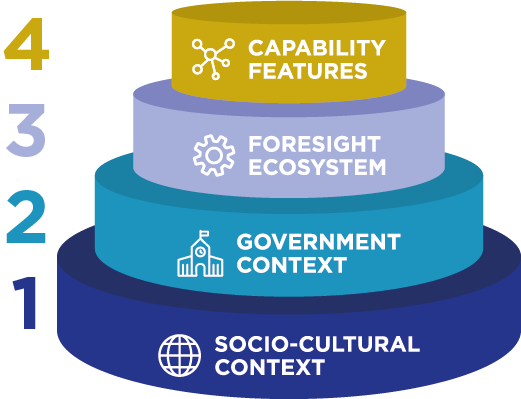
This week marks the launch of SOIFs report on Features of effective systemic foresight in governments around the world commissioned by the UK Government Office for Science. The capability to engage and prepare for the future is a critical one for 21st century democracies. Strategic foresight can help.
Making foresight effective
The report explores how eight governments have developed their foresight capabilities over time and integrated long-term thinking into policy making.
Exploring policy-making under conditions of deep uncertainty is hard. Thinking about the future has always been an implicit part of strategy and policy-making, within the UK. Internationally, there is renewed appetite for managing uncertainty, building resilience, and leading into the future. This can be seen at the highest levels of civil service, in parliament, and among ministers. The debate is no longer about whether strategic foresight can bring value. Now the focus is based on application, how to gain impact and ensure it translates into decision making.
Integrating systemic foresight
The report sets out why it is so important to consider taking a systemic approach when building government capability. This will use the full breadth of a country’s governance system. Examples include, the civil service or the legislature in cases such as Finland and Wales, the judiciary in Netherlands, and treasury and audit functions in New Zealand and United States. The report also highlights the importance of public participation and engagement.
Building long-term systemic change is hard and there is no silver bullet. There are common features and strategies that have helped countries to build their ecosystems. These include aspects of culture and behaviours, systems, processes, and people, that help match supply and demand and build capability throughout the system.
Continue the debate
The features identified in the report are applicable whether you are trying to build foresight at a team, departmental or systems level. Although context matters. As a result, a healthy foresight ecosystem will be able to match supply and demand, but it will also cultivate and nurture the foresight ecosystem, paying attention to the changing context and to the health of constituent parts of the ecosystem. This requires developing systems and processes because these will sustain and build resilience over time, as well as building connections across parts of the foresight ecosystem.
Contact SOIF
SOIF has extensive expertise in foresight governance and supports government and non-government organisations to drive more impact from their investment in foresight. For more information please contact Emma Bennett at SOIF.
